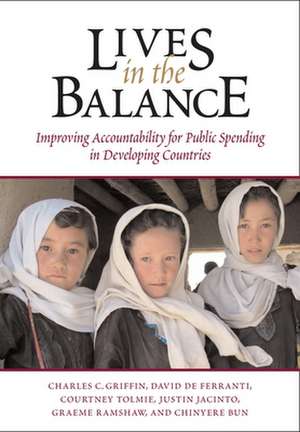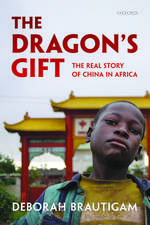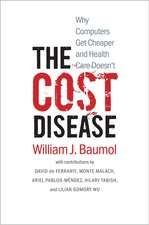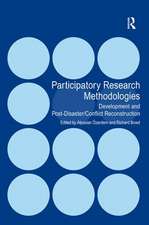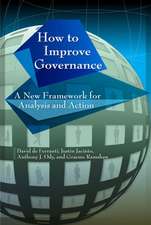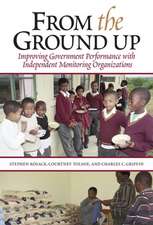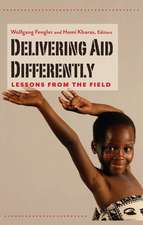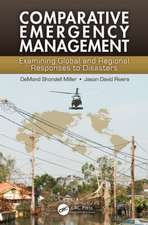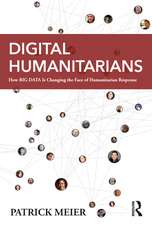Lives in the Balance: Improving Accountability for Public Spending in Developing Countries
Autor Charles C. Griffin, David de Ferranti, Courtney Tolmie, Justin Jacinto, Graeme Ramshawen Limba Engleză Paperback – 23 iul 2010
Because of its potential impact, and, in some cases, the harm it has brought, foreign aid is under the microscope. Donor countries, who don't want simply to give money away; recipient nations, who need to make the most of what they have and get; and analysts, policymakers, and writers are all scrutinizing how much is spent and where it goes. Perhaps more important, aid is only a small part of what developing country governments spend. Their own resources finance 80 percent or more of health and education spending except in the most aid-dependent countries. Lives in the Balance investigates a vital aspect of this landscape—how best to ensure that public spending, including aid money, gets to the right destination.
The development of democratic institutions and the spread of cheap communications technology in developing countries make it possible for the "demand-side"—citizens and civil society institutions—to advocate for improved transparency, stronger accountability, better priorities, reduced corruption, and more emphasis on helping the poor. Securing real reform will depend not only on knowledge of how the recipient government operates, but also how to work with partner entities—the media, the private sector, other organizations, and legislators—to raise awareness and compel change.
The development of democratic institutions and the spread of cheap communications technology in developing countries make it possible for the "demand-side"—citizens and civil society institutions—to advocate for improved transparency, stronger accountability, better priorities, reduced corruption, and more emphasis on helping the poor. Securing real reform will depend not only on knowledge of how the recipient government operates, but also how to work with partner entities—the media, the private sector, other organizations, and legislators—to raise awareness and compel change.
Preț: 211.74 lei
Nou
Puncte Express: 318
Preț estimativ în valută:
40.52€ • 42.39$ • 33.66£
40.52€ • 42.39$ • 33.66£
Carte tipărită la comandă
Livrare economică 03-17 aprilie
Preluare comenzi: 021 569.72.76
Specificații
ISBN-13: 9780815732891
ISBN-10: 0815732899
Pagini: 174
Ilustrații: Illustrations
Dimensiuni: 152 x 229 x 15 mm
Greutate: 0.3 kg
Editura: Brookings Institution Press
Colecția Brookings Institution Press
ISBN-10: 0815732899
Pagini: 174
Ilustrații: Illustrations
Dimensiuni: 152 x 229 x 15 mm
Greutate: 0.3 kg
Editura: Brookings Institution Press
Colecția Brookings Institution Press
Notă biografică
Charles C. Griffin is senior adviser to the vice president for Europe and Central Asia at the World Bank and former senior fellow in Global Economy and Development at Brookings Institution.
David de Ferranti is president of the Results for Development Institute and a former World Bank vice president.
Courtney Tolmie is a senior program officer for the Transparency and Accountability Program, a project of the Results for Development Institute.
Justin Jacinto, Graeme Ramshaw, and Chinyere Bun all have conducted research for Brookings.
David de Ferranti is president of the Results for Development Institute and a former World Bank vice president.
Courtney Tolmie is a senior program officer for the Transparency and Accountability Program, a project of the Results for Development Institute.
Justin Jacinto, Graeme Ramshaw, and Chinyere Bun all have conducted research for Brookings.
Descriere
Because of its potential impact, and, in some cases, the harm it has brought, foreign aid is under the microscope. Donor countries, who don't want simply to give money away; recipient nations, who need to make the most of what they have and get; and analysts, policymakers, and writers are all scrutinizing how much is spent and where it goes. Perhaps more important, aid is only a small part of what developing country governments spend. Their own resources finance 80 percent or more of health and education spending except in the most aid-dependent countries. Lives in the Balance investigates a vital aspect of this landscape—how best to ensure that public spending, including aid money, gets to the right destination.
The development of democratic institutions and the spread of cheap communications technology in developing countries make it possible for the "demand-side"—citizens and civil society institutions—to advocate for improved transparency, stronger accountability, better priorities, reduced corruption, and more emphasis on helping the poor. Securing real reform will depend not only on knowledge of how the recipient government operates, but also how to work with partner entities—the media, the private sector, other organizations, and legislators—to raise awareness and compel change.
The development of democratic institutions and the spread of cheap communications technology in developing countries make it possible for the "demand-side"—citizens and civil society institutions—to advocate for improved transparency, stronger accountability, better priorities, reduced corruption, and more emphasis on helping the poor. Securing real reform will depend not only on knowledge of how the recipient government operates, but also how to work with partner entities—the media, the private sector, other organizations, and legislators—to raise awareness and compel change.
